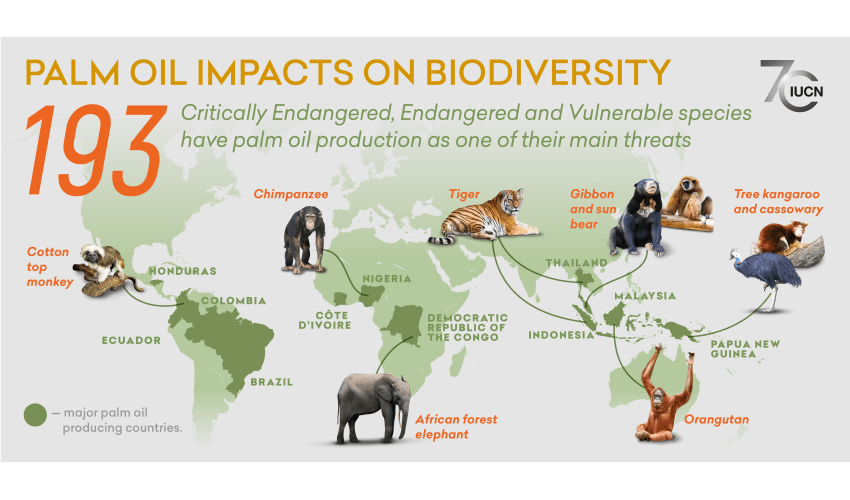Palm Oil And Biodiversity | UPSC : Palm oil is derived from the oil palm tree (Elaeis guineensis Jacq.), which is native to West Africa and grows best in tropical climates with abundant water. Three-quarters of total palm oil produced is used for food, particularly cooking oil and processed oils and fats. It is also used in cosmetics, cleaning products and biofuel.
About Palm Oil :
- Palm oil is used in food, cosmetics, cleaning products and biofuel, and only grows in the biodiversity-rich tropics.
- Palm oil is important for global food security and economic development.
- Palm oil production increased 15-fold between 1980 and 2014 and will likely increase further.
- Palm oil is an edible vegetable oil derived from the mesocarp (reddish pulp) of the fruit of the oil palms.
- Along with coconut oil, palm oil is one of the few highly saturated vegetable fats and is semisolid at room temperature.
- It is resistant to oxidation and so can give products a longer shelf-life; it’s stable at high temperatures
- The oil is used in food manufacturing, in beauty products, and as biofuel.
- Its use in the commercial food industry in other parts of the world is widespread because of its lower cost.
- Indonesia is the largest producer of palm oil, followed by Malaysia – both countries account for 84% of the worlds palm production.
- Globally palm oil supplies 35% of the world’s vegetable oil demand on just 10% of the land.
Read Also : Right to Protein Movement | UPSC
Largest User Of Palm oil :
- The largest user of palm oil are India (9.4 million tonnes) and Indonesia (6 million tonnes) – countries in which palm oil is traditionally used for cooking.
- The EU is the third-largest consumer of palm oil.
Largest Importer Of Palm Oil :
The largest importer of palm oil is
- India (19 per cent)
- The European Union (15 per cent, 7.3 million tonnes)
- China (14 per cent) (Index Muni, 2020).
India And Palm Oil :
- In India, oil palm is being cultivated in 13 states.
- Potential states are Andhra Pradesh, Gujarat, Karnataka, Tamil Nadu and Bihar.
- Andhra Pradesh (83.5 percent) along with Telangana accounts for about 97 percent of India’s 278,000 tonnes of crude palm oil production.
Why PalmOil is So Much important For World Food Security ?
- Currently about half the people in the world rely on palm oil as part of their diets and it is the dominant oil used in food in Africa and Asia. As the global population grows, palm oil’s role in meeting global food demand will increase.
- Oil palm plantations provide jobs and drive national economic development.
- The industry is an important source of employment in Indonesia and Malaysia.
- It also contributes to the development of remote areas via provision of infrastructure including roads, hospitals and schools.

Concerns Associated With Palm Oil Production
| Environmental impacts |
|
| Social impacts |
|
| Palm oil and Biodiversity |
|
What can We Do For Minimizing Impact Of Pal Oil Cultivation On Biodiversity ?
- Palm oil need to be produced more sustainably.
- Zero deforestation (including of secondary forest)
- No planting on peat
- Stricter targets to reduce greenhouse gas emissions
- A prohibition on the use of fire to clear land.
- A requirement to keep soils healthy and to prevent erosion.
- Safe pesticide use.
Roundtable on Sustainable Palm Oil or RSPO
- It was formed in 2004.
- The Roundtable on Sustainable Palm Oil was established in 2004 with the objective of promoting the growth and use of sustainable palm oil products through global standards and multistakeholder governance.
- The seat of the association is in Zurich, Switzerland, while the secretariat is currently based in Kuala Lumpur, with a satellite office in Jakarta.
- RSPO currently has 4,706 members from 94 countries
Vision & Missions :
- Advance the production, procurement, finance and use of sustainable palm oil products
- Develop, implement, verify, assure and periodically review credible global standards for the entire supply chain of sustainable palm oil
- Monitor and evaluate the economic, environmental and social impacts of the uptake of sustainable palm oil in the market
- Engage and commit all stakeholders throughout the supply chain, including governments and consumers.








